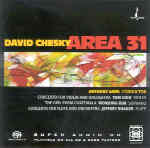David Chesky comes of age as a “classical” composer with these two concertos, in which his personal brand of Latin jazz finds itself in the company of ideas that lend themselves to large-scale forms, and a colorful orchestral idiom that consistently engages the ear and makes for rewarding repeated listening. The Violin Concerto employs a spiky and pungent quasi-tonal language, with clear-cut, memorable thematic material and a vibrant rhythmic impetus (much flamenco-style hand-clapping, in all three works). Chesky’s writing for woodwinds, bassoons especially, may bring to mind Ginastera or Villa-Lobos, but with greater transparency in the orchestration, which features lots of tuned percussion and some lovely passages for harp. The solo part is busy but never lacks lyricism, and it’s particularly gratifying to hear how Chesky seems to have really thought about how to characterize the solo role–I’m thinking here of the evocative soft interlude about five minutes into the first movement–while the neo-Baroque, triple-time finale sounds particularly splendid.
Violinist Tom Chiu plays with the necessary gusto and with the kind of personality the music invites, observations that also are true of Jeffrey Khaner’s contribution to the Flute Concerto, which is very similar in style to the Violin Concerto but a bit more jovial in outlook. Again, Chesky has taken care to imagine the music as a vehicle for the flute, and the result is a charming work that really does seem created for this particular combination rather than generic music coincidentally scored as a flute concerto. It’s especially good to learn that Chesky can “write classical” and not entirely abandon his sense of humor too.
The Girl from Guatemala is a short concert aria that sets an English translation of Poem No. 9 by Cuban poet Jose Marti, about a girl who dies of love after being abandoned by her boyfriend. Here, I have to say, Chesky has written an instrumental concerto movement and given it to the voice. The vocal line is nearly unsingable, the words largely incomprehensible despite the fearless efforts of soprano Wonjung Kim. It’s not a bad piece–the delicate opening is lovely–but it’s not on the level of the two concertos.
Aria 31, a modern-music ensemble led by Anthony Aibel, plays all of this music with real enthusiasm, and they clap with bravura. I’m not joking: the rhythmic element is really important here, and it needs commitment as well as accuracy so as not to sound self-conscious or gimmicky. I particularly like their willingness to let the music swing a bit–and get rowdy at the chaotic climaxes that punctuate both concerto finales. As with most Chesky productions, the sound is state-of-the-art, whether in stereo or multichannel format. There’s real substance here, and a dynamic, creative personality at work. I’m very interested to hear how Chesky will follow this achievement, and I hope that the wait won’t be too long. [3/4/2005]
































